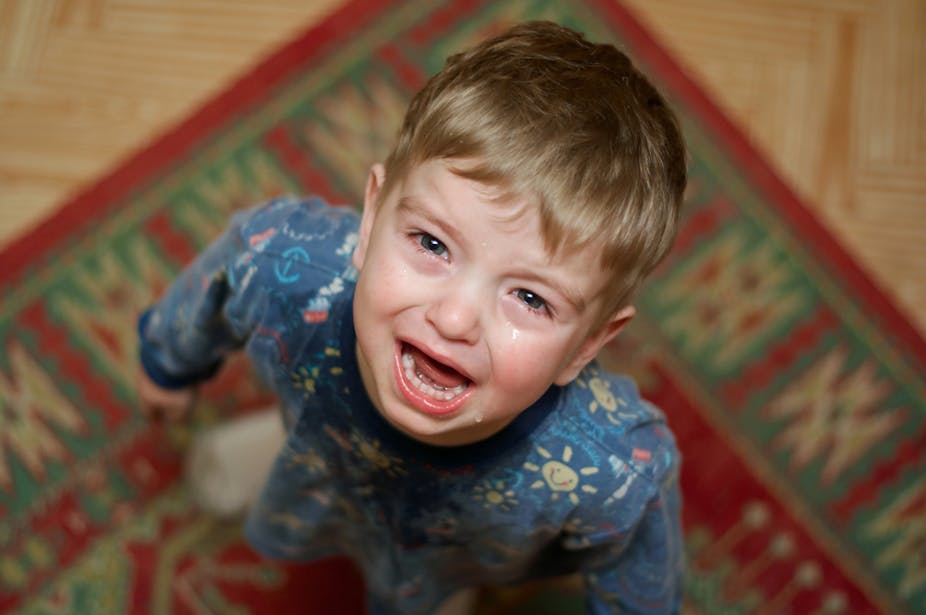Most parents want what’s best for their children. But when it comes to discipline, some misguidedly use physical force to punish or intimidate. Let’s be clear: hitting and unnecessarily hurting children is never justified and is never okay.
The Australian government has ratified the United Nations Convention on the Rights of the Child (1989). In other words, Australia recognises children as people with rights. So it’s time for governments in Australia to join the 33 enlightened countries in the world, including New Zealand, and ban the physical punishment of children in all settings, including the child’s home.
A successful ban on physical punishment of children must also be accompanied by a campaign to support and educate parents to change their outdated attitudes about “smacking”.
Harms of physical punishment
Physical punishment, even when it’s called “discipline” or “smacking”, can inflict both short- and long-term harm on children. We now know, through rigorous research, that there are associations between physical punishment and the adoption of aggressive and violent behaviours, impaired mental health, and other health issues and disadvantages.
Even without the research evidence, we intuitively know that hitting and unnecessarily hurting people affects warm and trusting relationships. Our children are the adults of the future. How we treat our children today will affect their health, self-esteem, and sense of well-being.
Changing behaviour
Australia has been at the forefront of many public health reforms such as seat belts in cars, tobacco control and condom use, but we’re yet to see a similar wake-up call on physical punishment.
But how do you get parents to change their behaviour – to stop “smacking” their children?
Metro Trains’ recent, highly successful animated public education campaign, titled Dumb Ways To Die, is a good example of how an advertising campaign can help change outdated attitudes and risk-taking behaviours. In this case, it promotes rail safety to young people via ads in newspapers, on radio, billboards, throughout the Metro Trains network and on Tumblr.
The campaign aims “to engage an audience that really doesn’t want to hear any kind of safety message”. As Metro Trains’ marketing manager explains, the campaign:
…is designed to draw people to the safety message…We want to create a lasting understanding that you shouldn’t take risks around trains, that the prospect of death or serious injury is ever-present.
An education campaign such as this, with supports and incentives to encourage parents to adopt positive disciplinary methods, may be what is needed to change the outdated attitudes and risk-taking behaviours of parents.
Such a campaign could be both hard-hitting and inspiring; portraying the immediate and possible impacts of physical punishment through words and pictures. It could also provide important information about normal childhood development, and positive ways to interact with, and to set reasonable boundaries for, children.
In Sweden, corporal punishment and other humiliating treatment of children were banned in 1979, and pamphlets were provided to every household with children, and information on milk cartons also told people about the reform and encouraged discussions between parents and children.
The result? Most modern Swedish families practice positive, non-violent discipline. Children are respected, and parents are valued and supported in their important role as models for their children.
Changing the law
Some responsible adults will willingly modify their attitudes and behaviours in light of evidence that motivates desirable change. But sometimes behavioural change only occurs in response to legislation or law reform.
Amending the relevant legislation in each of Australia’s states and territories to explicitly remove the “lawful correction” defence to assault will send a clear message to parents that physical punishment is no longer an excusable form of discipline or control of children. Children will then have the same protection from assault afforded to adults.
Both police discretion and the “de minimis” principle (which discards trivial matters) will guard against the criminalisation of parents who occasionally “smack” their children but physical punishment will be strongly discouraged. Positive changes in attitudes and behaviour will take time, education and parental support.
Giving children a voice
Hitting and unnecessarily hurting children degrades all children who live in societies that allow children to be treated in this way. When given an opportunity to comment on physical punishment, children have said it hurts them physically and emotionally.
At the same time, children empathise with parents who are tired and stressed and who lash out at them in anger, and they understand but question parents’ belief that hitting children teaches them positive lessons in how to behave.
Parents have expressed regret for having resorted to hitting their children - they would prefer to use alternative means of discipline that don’t result in anger, tears and resentment. In extreme cases, parents’ regrets are futile as their children have been seriously injured - and even killed - when their “physical punishment” has gone tragically wrong.

As children are the recipients of physical punishment, their comments on this issue are often refreshingly candid. As one eight-year-old child said,
Since adults are older, they think they know most stuff but sometimes they don’t…sometimes they’re mistaken.
Another suggested that adults do not “have to smack because you can choose”.
Encouraging children to speak about issues such as “smacking”, and listening to what they say, ought to prompt us to question our out-dated perspectives. We may even finally accept that, as a 12 year-old commented:
…you shouldn’t hit people because there’s a better way…than hurting someone.
The physical punishment of children will continue to be tolerated and defended until responsible, enlightened adults recognise that children are not lesser beings than adults.
Children have human rights to the dignity and respect afforded to other people and they deserve at least equal, if not greater, legal protection from assault. It should no longer be defended.i

